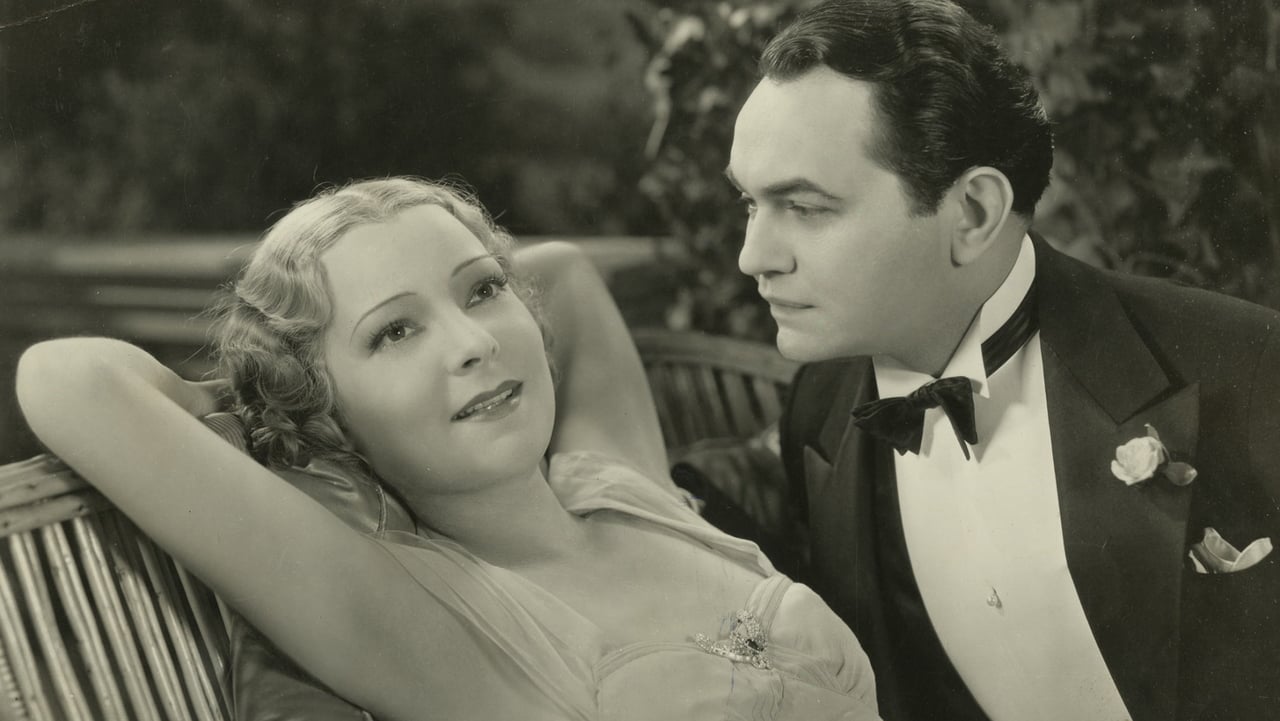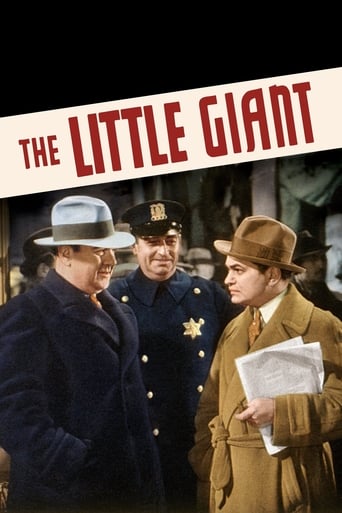

Edward G. Robin is "The Little Giant" in this 1933 comedy which also stars Mary Astor and Helen Vinson.Robinson plays Bugs Ahern, a notorious bootleg king at the end of Prohibition, who decides to take all his money, quit the mob life, and break into California high society.He's not exactly a slam-dunk for polite society - he talks like a thug, for one thing -- and when he meets a glamorous woman, Polly Cass, from a prominent family, he falls hard. She invites him to tea, and he goes to buy the right clothes. His credit is checked, and word gets around at the tea that he's a millionaire. Polly and her family are at that moment completely interested and invite him back.Ahern visits a Realtor, Ruth Wayburn (Mary Astor), and rents a house she finds him, not knowing that it's her house and that she has fallen on hard times. Impressed by Ruth's knowledge of all things upper class, he hires her as his assistant.Ahern proposes to Polly and also buys into her father's bond business. Little does he know, trouble will follow. Very amusing comedy, with Robinson, overdressed for most occasions, attempts to deal with old money by playing polo and juggling appetizers. In one of the first scenes, he and his buddy who insisted on coming to California with him, Al (Russell Hopton) are in a very high class French restaurant, where Bugs acts like he can speak French as he orders from the menu (and by the way, at this high-class, expensive restaurant, the entrées were $1.50; also his expensive hotel was $45/day).The funniest, however, is the polo scene, and also some scenes toward the end when Ahern is forced to call on his old crowd for some help.Very enjoyable, with Robinson fabulous as a bull in a china shop.
... View MoreProhibition has come to an end, and just as fast as Kevin Costner's Elliot Ness was ready to go get a drink, bootlegger Edward G. Robinson is ready to become respectable. He doesn't plan on getting hoodwinked by a bunch of "fags", he says, referring to the wealthy people of Santa Barbara in that term to indicate "well-dressed swells", not cigarettes, bundles of sticks or gay men. This is a sassy pre-code comedy of the snobs versus the slobs, where Chicago meets California elite, where manners meet muscatel. Along the way, Robinson rents a huge mansion from the pretty but broke Mary Astor who hires her former servants out to him but begs their confidentiality in order to pay off back taxes. As for the wealthy family who gets him involved in a business scheme, there's the fickle Helen Vinson, a socialite with candied lips but an acid tongue, pompous father Berton Churchill, horse-faced mother Louise Mackintosh (whom I whinny at every time I see her) and good for nothing brother Don Dillaway. It is clear from the beginning that Astor is more the one to teach Robinson the real meaning of good breeding, and it is also apparent that Robinson will utilize his band of merry dumbbells from Chicago to seek revenge on the family who underestimated his lack of sophistication.This is delightful pre-code comedy, with shots of the reformed mobsters attempting to play polo, and much witty dialog to boot as Robinson tries to fit in an element that perhaps he was better avoiding. He gets to learn that all so-called "decent" people aren't necessarily "nice" people and they find out that he isn't above resorting to old methods in order to cinch a business deal. Churchill, it seems, is bilking clients with worthless stock, and when Robinson gets involved, he is the one left holding the bag. But big business for him is just like his was during the depression, and after a memorable opening where he expresses his fury towards FDR for ruining his business. The cops who used to try to catch him smuggling his illegal beer now jeer him for being a has-been so he sets off to prove he can be legitimate. This gives Robinson a lot of juicy material to handle and two beautiful if different leading ladies to play off of. That makes this one of those pre-code films that remains entertaining and historically interesting, although his Bugs is certainly not as threatening as his Rico was in "Little Caesar".
... View MoreProhibition ends and gangster boss Bugsy Ahearn, like so many during the depression, finds himself unemployed. What to do? Fortunately, he has laid aside much of his ill-gotten gains and has no money worries. So he decides to improve himself, to acquire some culture and move in elite circles. And therein lies a very funny story.Edward G. Robinson shows a flair for comedy and shows off some of his immense talent as a social climber who decides to shoot the moon. He moves from Chicago to the West Coast, buys a mansion and falls for a lady from a family of swindlers, and generally falls into a series of mishaps, each one funnier than the last. He gets excellent support from Mary Astor, who becomes his guide to the finer points of becoming 'quality'.You will gain great respect for Robinson if you've only seen him in tough-guy roles, as he carries the picture as a society naif in this written-for-the-screen comedy. There are no dead spots, either, as the story moves along briskly in an enjoyable 75 minutes. It was shown at Cinefest, Columbus, O., 6/13.
... View MorePart of Edward G. Robinson's longevity in movies was his ability to choose the occasional film that showed he could laugh at the tough characters he created. In "The Whole Town's Talking" (1935) and "A Slight Case of Murder" (1938) he successfully kidded his own genre but he did it first with "The Little Giant" (1933).He plays Bugsy Ahearn, a Chicago beer baron and the film begins with the election of President Roosevelt. That spells the end of prohibition but O'Hearn has already started making plans - reading books on ancient Greece by Plato (Pluto!!!), buying modern art, taking up golf, in other words getting "cultured"!! - he is determined to "crash society"!!! His gang is like one big happy family but after he and Al (Russell Hopton) go out to California, he finds he is swimming with sharks when he becomes entangled with the fortune hunting Cass family. He falls instantly in love with Polly (Helen Vinson) but each of the family fleeces him in different ways until the father sells him a worthless company. Of course they don't realise he has made his money bootlegging and when they do that is the only excuse they need to break Polly's engagement, flee the country and leave him holding the bag - but not before he sends for his old cronies to dispense some Chicago rough justice of his own.This movie is just so much fun - Edward G. Robinson almost over- powers the whole cast and he really struts his stuff and gives the movie going public exactly what they expected from him in 1933 but with the added bonus of laughs!!! Mary Astor is as usual gorgeous and fully up to Robinson as Ruth. She plays a once wealthy girl, whose father has been financially ruined and she is now reduced to renting out the family mansion to Ahearn. She becomes his unofficial teacher, showing him how to act, how to give dinner parties and also that not everyone is as horrible as the Casses. Helen Vinson played the fortune hunting Polly to perfection but, strangely, I found her not as attractive as she usually is. Berton Churchill had also perfected roles like the conniving Father Cass and he was excellent. Shirley Grey was another example of a pretty, talented actress who just didn't make it big - she played Ahearn's cast off mistress, Edith. It was nice to see Russell Hopton with a decent part in a grade A film. He has one of the best lines in the movie. When O'Hearn asks him if he has ever seen a painting like that before, he replies "Not since I stopped using cocaine!!!!!"Highly, Highly Recommended.
... View More